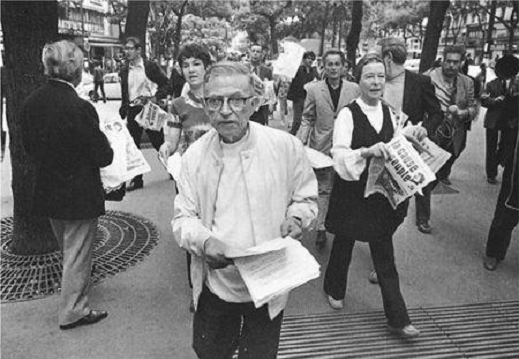The full version of that famous quote, about the only thing most college educated Americans think they know about Sartre's turgid, voluminous and entirely pointless writing is
GARCIN: Le bronze .. . (Il le caresse.) Eh bien, voici le moment. Le bronze est là, je le contemple et je comprends que je suis en enfer. Je vous dis quentout était prévu. Ils avaient prévu que je me
tiendrais devant cette cheminée, pressant manmain sur ce bronze, avec tous ces regards sur
moi . Tous ces regards qui me mangent .. . (Il se retourne brusquement.) Ha ! vous n'êtes que
deux ? Je vous croyais beaucoup plus nombreuses. (Il rit.) Alors, c'est ça l'enfer. Je n'aurais
jamais cru ... Vous vous rappelez : le soufre, le bûcher, le gril... Ah ! quelle plaisanterie . Pas
besoin de gril : l'enfer, c'est les Autres.
GARCIN: This bronze. Yes, now's the moment; I'm looking at this thing on the
mantelpiece, and I understand that I'm in hell. I tell you, everything's been thoughtout
beforehand. They knew I'd stand at the fireplace stroking this thing of bronze, with all
those eyes intent on me. Devouring me. What? Only two of you? I thought there were
more; many more. So this is hell. I'd never have believed it. You remember all we were
told about the torture-chambers, the fire and brimstone, the "burning marl." Old wives'
tales! There's no need for red-hot pokers. HELL IS-OTHER PEOPLE! [Not my translation, one taken from the web, but it will do.]
What Sartre meant is that the very fact that there are other people in the world with us is hell because we have to think of what they think of us as they observe our behavior. It's the philosophy of a sociopathic, solipsistic jerk.
If I cared I'd go look up the relevant passages in Being and Nothingness, etc. to back up the point. But why bother with people who don't even know that much of the context of the thing.
And, I'll remind people, Sartre was such a great moral force and thinker on such things that he was a famous and active - if pretty much a for-show as a reigning vedette of the intellectual Parisian Left - Maoist at the height of Mao's reign of murder, outdoing Hitler at the height of his reign of murder.
For someone who found it so existentially painful to have to think of other people looking at us while we might merely touch a bronze statue, he seldom lost an opportunity to make a world-wide spectacle of himself as an advocate for the reigning champion of murder as he passed out Maoist hand-bills in Paris, mugging for the cameras that would record it for all the fashionable journals. The biggest Vichyist, collaborating apologist for Hitler at the height his mass murders is as worthy of respect as Sartre was. The only thing either deserves is absolute and total scorn.
Update: No, dopey, I wasn't making that up. Here's a picture of Sartre and his equally assholish girlfriend and fan of de Sade, Simone de Beauvoir, doing exactly that in 1970, the height of the Cultural Revolution that killed an unknown number of people, scholars estimating the figure well into the millions. We don't know because there is no transparency in Sartre's workers paradise, which he and his girlfriend, notably, did not elect to live in.

Modern literary theory tells us the first mistake you make in fiction is attributing the statements of a character to the author.
ReplyDeleteKierkegaard had great fun with that idea. So did Poe (his narrator of "The Tell-Tale Heart" is the unrecognized most-unreliable narrator of all time. Someday I'll have to explain that on-line....). It's an idea that got shattered in the 19th century, that the narrator is the novelist. Funniest part is, Sartre didn't say "Hell is other people." One of his characters did.
Might as well say Shakespeare said "My kingdom for a horse!" or that Swift advocated selling the children of the Irish poor as food for the table.
These things that pass for knowledge I don't understand.....
Except he did state pretty much the same I idea as philosophy in Being and Nothingness. I think I've got a copy of it somewhere, if I can figure out where I might dig it out.
DeleteI remember sitting there reading Huis Clos for a class in college wondering how anyone could think it was anything but interminable. Then I saw it acted out and I thought that was worse, if anything.
I don't hate to say it but I prefer Marcel Aymé.